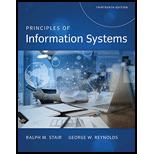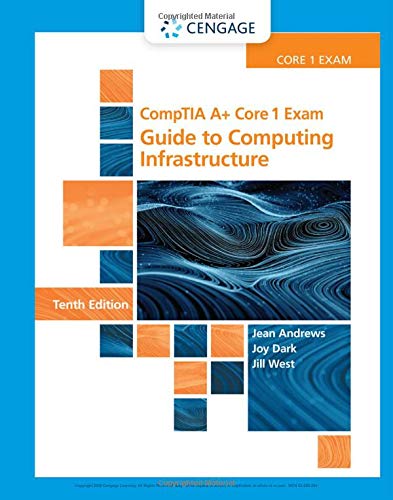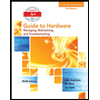
Principles of Information Systems (MindTap Course List)
13th Edition
ISBN: 9781305971776
Author: Ralph Stair, George Reynolds
Publisher: Cengage Learning
expand_more
expand_more
format_list_bulleted
Expert Solution & Answer
Chapter 3, Problem 3SAT
Program Description Answer
“Advanced RISC Machines (ARM) processors do not generate as much heat” as traditional x86 complex instruction set processors.
Hence, the correct answer is option “A”.
Expert Solution & Answer
Trending nowThis is a popular solution!

Students have asked these similar questions
I need help fixing the minor issue where the text isn't in the proper place, and to ensure that the frequency cutoff is at the right place.
My code:
% Define frequency range for the plot
f = logspace(1, 5, 500); % Frequency range from 10 Hz to 100 kHz
w = 2 * pi * f; % Angular frequency
% Parameters for the filters - let's adjust these to get more reasonable cutoffs
R = 1e3; % Resistance in ohms (1 kΩ)
C = 1e-6; % Capacitance in farads (1 μF)
% For bandpass, we need appropriate L value for desired cutoffs
L = 0.1; % Inductance in henries - adjusted for better bandpass response
% Calculate cutoff frequencies first to verify they're in desired range
f_cutoff_RC = 1 / (2 * pi * R * C);
f_resonance = 1 / (2 * pi * sqrt(L * C));
Q_factor = (1/R) * sqrt(L/C);
f_lower_cutoff = f_resonance / (sqrt(1 + 1/(4*Q_factor^2)) + 1/(2*Q_factor));
f_upper_cutoff = f_resonance / (sqrt(1 + 1/(4*Q_factor^2)) - 1/(2*Q_factor));
% Transfer functions
% Low-pass filter (RC)
H_low = 1 ./ (1 + 1i * w *…
My code is experincing minor issue where the text isn't in the proper place, and to ensure that the frequency cutoff is at the right place.
My code:
% Define frequency range for the plot
f = logspace(1, 5, 500); % Frequency range from 10 Hz to 100 kHz
w = 2 * pi * f; % Angular frequency
% Parameters for the filters - let's adjust these to get more reasonable cutoffs
R = 1e3; % Resistance in ohms (1 kΩ)
C = 1e-6; % Capacitance in farads (1 μF)
% For bandpass, we need appropriate L value for desired cutoffs
L = 0.1; % Inductance in henries - adjusted for better bandpass response
% Calculate cutoff frequencies first to verify they're in desired range
f_cutoff_RC = 1 / (2 * pi * R * C);
f_resonance = 1 / (2 * pi * sqrt(L * C));
Q_factor = (1/R) * sqrt(L/C);
f_lower_cutoff = f_resonance / (sqrt(1 + 1/(4*Q_factor^2)) + 1/(2*Q_factor));
f_upper_cutoff = f_resonance / (sqrt(1 + 1/(4*Q_factor^2)) - 1/(2*Q_factor));
% Transfer functions
% Low-pass filter (RC)
H_low = 1 ./ (1 + 1i * w *…
I would like to know the main features about the following three concepts:
1. Default forwarded
2. WINS Server
3. IP Security (IPSec).
Chapter 3 Solutions
Principles of Information Systems (MindTap Course List)
Ch. 3.1 - Prob. 1RQCh. 3.1 - Prob. 2RQCh. 3.1 - Prob. 1CTQCh. 3.1 - Prob. 2CTQCh. 3.2 - Prob. 1RQCh. 3.2 - Prob. 2RQCh. 3.2 - Prob. 1CTQCh. 3.2 - Prob. 2CTQCh. 3.3 - Prob. 1RQCh. 3.3 - Prob. 2RQ
Ch. 3.3 - Prob. 1CTQCh. 3.3 - Prob. 2CTQCh. 3 - Prob. 1SATCh. 3 - Prob. 2SATCh. 3 - Prob. 3SATCh. 3 - Prob. 4SATCh. 3 - Prob. 5SATCh. 3 - LI is the fastest type of cache memory built into...Ch. 3 - Prob. 7SATCh. 3 - Prob. 8SATCh. 3 - Prob. 9SATCh. 3 - Prob. 10SATCh. 3 - Prob. 11SATCh. 3 - Prob. 12SATCh. 3 - A _________ is a low-cost, centrally managed...Ch. 3 - Prob. 14SATCh. 3 - Prob. 15SATCh. 3 - Prob. 16SATCh. 3 - Prob. 17SATCh. 3 - Identify four fundamental components of every...Ch. 3 - What is the purpose of the computer bus?Ch. 3 - Prob. 3RQCh. 3 - Prob. 4RQCh. 3 - Prob. 5RQCh. 3 - Prob. 6RQCh. 3 - Prob. 7RQCh. 3 - Prob. 8RQCh. 3 - Prob. 9RQCh. 3 - Prob. 10RQCh. 3 - Prob. 11RQCh. 3 - Prob. 12RQCh. 3 - Prob. 13RQCh. 3 - Prob. 14RQCh. 3 - Prob. 15RQCh. 3 - Prob. 16RQCh. 3 - Prob. 17RQCh. 3 - Prob. 18RQCh. 3 - Prob. 1DQCh. 3 - Prob. 2DQCh. 3 - Prob. 3DQCh. 3 - Prob. 4DQCh. 3 - Prob. 5DQCh. 3 - Prob. 6DQCh. 3 - Prob. 7DQCh. 3 - Prob. 8DQCh. 3 - Prob. 9DQCh. 3 - Prob. 10DQCh. 3 - Prob. 11DQCh. 3 - Prob. 12DQCh. 3 - Prob. 13DQCh. 3 - Prob. 3PSECh. 3 - Prob. 1TACh. 3 - Prob. 2TACh. 3 - Prob. 1WECh. 3 - Prob. 2WECh. 3 - Prob. 3WECh. 3 - Prob. 1CECh. 3 - Prob. 2CECh. 3 - Prob. 3CECh. 3 - Prob. 1CTQ1Ch. 3 - Prob. 2CTQ1Ch. 3 - Prob. 3CTQ1Ch. 3 - Prob. 1CTQ2Ch. 3 - Prob. 2CTQ2Ch. 3 - Prob. 3CTQ2
Knowledge Booster
Similar questions
- map the following ER diagram into a relational database schema diagram. you should take into account all the constraints in the ER diagram. Underline the primary key of each relation, and show each foreign key as a directed arrow from the referencing attributes (s) to the referenced relation. NOTE: Need relational database schema diagramarrow_forwardWhat is business intelligence? Share the Business intelligence (BI) tools you have used and explain what types of decisions you made.arrow_forwardI need help fixing the minor issue where the text isn't in the proper place, and to ensure that the frequency cutoff is at the right place. My code: % Define frequency range for the plot f = logspace(1, 5, 500); % Frequency range from 10 Hz to 100 kHz w = 2 * pi * f; % Angular frequency % Parameters for the filters - let's adjust these to get more reasonable cutoffs R = 1e3; % Resistance in ohms (1 kΩ) C = 1e-6; % Capacitance in farads (1 μF) % For bandpass, we need appropriate L value for desired cutoffs L = 0.1; % Inductance in henries - adjusted for better bandpass response % Calculate cutoff frequencies first to verify they're in desired range f_cutoff_RC = 1 / (2 * pi * R * C); f_resonance = 1 / (2 * pi * sqrt(L * C)); Q_factor = (1/R) * sqrt(L/C); f_lower_cutoff = f_resonance / (sqrt(1 + 1/(4*Q_factor^2)) + 1/(2*Q_factor)); f_upper_cutoff = f_resonance / (sqrt(1 + 1/(4*Q_factor^2)) - 1/(2*Q_factor)); % Transfer functions % Low-pass filter (RC) H_low = 1 ./ (1 + 1i * w *…arrow_forward
- Task 3. i) Compare your results from Tasks 1 and 2. j) Repeat Tasks 1 and 2 for 500 and 5,000 elements. k) Summarize run-time results in the following table: Time/size n String StringBuilder 50 500 5,000arrow_forwardCan you please solve this without AIarrow_forward1. Create a Vehicle.java file. Implement the public Vehicle and Car classes in Vehicle.java, including all the variables and methods in the UMLS. Vehicle - make: String model: String -year: int + Vehicle(String make, String, model, int, year) + getMake(): String + setMake(String make): void + getModel(): String + setModel(String model): void + getYear(): int + set Year(int year): void +toString(): String Car - numDoors: int + numberOfCar: int + Car(String make, String, model, int, year, int numDoors) + getNumDoors(): int + setNumDoors (int num Doors): void + toString(): String 2. Create a CarTest.java file. Implement a public CarTest class with a main method. In the main method, create one Car object and print the object using System.out.println(). Then, print the numberOfCar. Your printing result must follow the example output: make Toyota, model=Camry, year=2022 numDoors=4 1 Hint: You need to modify the toString methods in the Car class and Vehicle class!arrow_forward
- CHATGPT GAVE ME WRONG ANSWER PLEASE HELParrow_forwardHELP CHAT GPT GAVE ME WRONG ANSWER Consider the following implementation of a container that will be used in a concurrent environment. The container is supposed to be used like an indexed array, but provide thread-safe access to elements. struct concurrent_container { // Assume it’s called for any new instance soon before it’s ever used void concurrent_container() { init_mutex(&lock); } ~concurrent_container() { destroy_mutex(&lock); } // Returns element by its index. int get(int index) { lock.acquire(); if (index < 0 || index >= size) { return -1; } int result = data[index]; lock.release(); return result; } // Sets element by its index. void set(int index, int value) { lock.acquire(); if (index < 0 || index >= size) { resize(size); } data[index] = value; lock.release(); } // Extend maximum capacity of the…arrow_forwardWrite a C program using embedded assembler in which you use your own function to multiply by two without using the product. Tip: Just remember that multiplying by two in binary means shifting the number one place to the left. You can use the sample program from the previous exercise as a basis, which increments a variable. Just replace the INC instruction with SHL.arrow_forward
arrow_back_ios
SEE MORE QUESTIONS
arrow_forward_ios
Recommended textbooks for you
 Principles of Information Systems (MindTap Course...Computer ScienceISBN:9781305971776Author:Ralph Stair, George ReynoldsPublisher:Cengage Learning
Principles of Information Systems (MindTap Course...Computer ScienceISBN:9781305971776Author:Ralph Stair, George ReynoldsPublisher:Cengage Learning Systems ArchitectureComputer ScienceISBN:9781305080195Author:Stephen D. BurdPublisher:Cengage Learning
Systems ArchitectureComputer ScienceISBN:9781305080195Author:Stephen D. BurdPublisher:Cengage Learning Fundamentals of Information SystemsComputer ScienceISBN:9781305082168Author:Ralph Stair, George ReynoldsPublisher:Cengage Learning
Fundamentals of Information SystemsComputer ScienceISBN:9781305082168Author:Ralph Stair, George ReynoldsPublisher:Cengage Learning Principles of Information Systems (MindTap Course...Computer ScienceISBN:9781285867168Author:Ralph Stair, George ReynoldsPublisher:Cengage Learning
Principles of Information Systems (MindTap Course...Computer ScienceISBN:9781285867168Author:Ralph Stair, George ReynoldsPublisher:Cengage Learning Comptia A+ Core 1 Exam: Guide To Computing Infras...Computer ScienceISBN:9780357108376Author:Jean Andrews, Joy Dark, Jill WestPublisher:Cengage Learning
Comptia A+ Core 1 Exam: Guide To Computing Infras...Computer ScienceISBN:9780357108376Author:Jean Andrews, Joy Dark, Jill WestPublisher:Cengage Learning A+ Guide to Hardware (Standalone Book) (MindTap C...Computer ScienceISBN:9781305266452Author:Jean AndrewsPublisher:Cengage Learning
A+ Guide to Hardware (Standalone Book) (MindTap C...Computer ScienceISBN:9781305266452Author:Jean AndrewsPublisher:Cengage Learning

Principles of Information Systems (MindTap Course...
Computer Science
ISBN:9781305971776
Author:Ralph Stair, George Reynolds
Publisher:Cengage Learning

Systems Architecture
Computer Science
ISBN:9781305080195
Author:Stephen D. Burd
Publisher:Cengage Learning

Fundamentals of Information Systems
Computer Science
ISBN:9781305082168
Author:Ralph Stair, George Reynolds
Publisher:Cengage Learning

Principles of Information Systems (MindTap Course...
Computer Science
ISBN:9781285867168
Author:Ralph Stair, George Reynolds
Publisher:Cengage Learning

Comptia A+ Core 1 Exam: Guide To Computing Infras...
Computer Science
ISBN:9780357108376
Author:Jean Andrews, Joy Dark, Jill West
Publisher:Cengage Learning

A+ Guide to Hardware (Standalone Book) (MindTap C...
Computer Science
ISBN:9781305266452
Author:Jean Andrews
Publisher:Cengage Learning